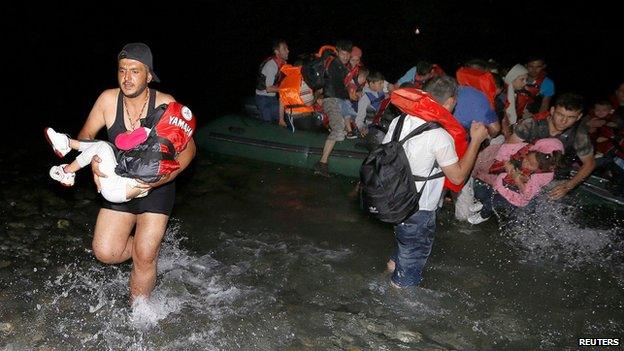Thomson boss: Greece needs help to tackle migrant 'tragedy'
- Published
- comments

The announcement of travel giant Tui Group's results this morning were always going to be dominated by the impact of the terrible events in Tunisia in June.
Of the 38 people killed in the terror attack at a resort near Sousse, 33 were on Tui holidays, 30 of whom were British.
In an interview with me this morning, Peter Long, the chief executive of Tui, which owns the travel companies Thomson and First Choice, said that the attack was "the most tragic event and loss of human life that I have ever had to deal with".
You can read about the full impact on the company here.
Mr Long also told me of his new fears about a different part of the world - Greece. There, he said, images of clashes between migrants and local officials on Kos and other important tourist islands in Greece could damage the vital holiday industry.
Peter Long: "the most tragic event and loss of human life that I have ever had to deal with ...we remain deeply shocked"
It is time for European governments to help Greece deal with the migrant issue, coming as it does hard on the heels of the economic crisis.
"Here we have another tragedy unfolding in terms of those migrants and we have to have empathy and sympathy for them - being forced to go onto boats and desperately trying to arrive in other countries and arriving in some of the Greek island, notably Kos," he said.
"I think the Greek authorities are doing all they can to be thoughtful and caring towards these migrants and process them through the system so they can go from the islands to the mainland where it will be easier to assist them."
Economic turmoil
Tourism is one of Greece's most important industries, worth about £20bn a year to the country. More than 650,000 people are employed in the holiday sector and more than 22 million people travel to Greece every year from around the world.
In its third quarter results, Tui said that the economic turmoil of the debt crisis had affected demand for Greek holidays, especially from Germany. A developing issue around immigration could pose a fresh threat to the sector.
"I worry about the publicity putting people off going to the Greek islands," Mr Long said.
"Those poor unfortunate migrants are located at the moment in Kos town and we have hotels throughout the island."
"Therefore I hope the Greeks are able to process [the migrants] and I'm sure other European governments will look at ways of helping them through this difficult situation with so many migrants arriving at the same time."
"We know that tourism for Greece is so important, their economy is fragile and what we don't want to see [is] a deteriorating demand from our customers going to the Greek islands."
"So I hope this situation is resolved quickly so our customers don't become concerned about travelling to Greece."